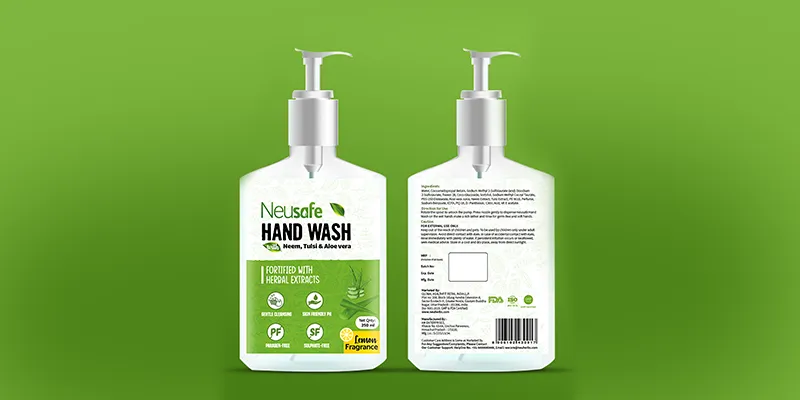How this natural health and wellness brand sold 20 million products in four years
Noida-based Neuherbs India manufactures plant-based ayurvedic products in the health, wellness, diet, and nutrition categories. The company, which started by selling green coffee and apple cider vinegar in 2016, has over 30 SKUs.
Amit Tyagi and Namit Tyagi were always inclined towards health and fitness. While Namit is a sports nutritionist and is a postgraduate in Dietetics and Health Management from Delhi’s YMCA, Amit has worked with companies like .
While working in their respective fields, the brothers realised that lifestyle issues like diabetes, weight management, and nutrition are some of the major problems in India. They wanted to solve these problems using natural ingredients like plant-based herbs. This set the ball rolling for India, which was launched in 2016.
The Noida-based company manufactures plant-based ayurvedic products in the health, wellness, diet, and nutrition categories.
The company started by selling green coffee and apple cider vinegar in 2016. Today, it has over 30 stock keeping units (SKUs) across four categories including health, hygiene, and nutrition.
The company, which is making its way into a market dominated by the likes of Dabur, Himalaya and Patanjali, says it has sold 20 million products so far, and claims to be clocking a turnover of Rs 8 crore quarterly.

Workers at Neuherbs packing products for delivering
Curing ailments naturally
Amit says different regions in India suffer from different ailments. While weight management is a common problem in some regions of North India, in Himachal and Uttar Pradesh, getting proper nutrition is a problem.
This made Amit and Namit come up with the idea to formulate and sell products under three broad categories - general health, diet and nutrition, and superfoods.
To tap into the market, Neuherbs initially focussed on solving queries of customers through a helpline number. The company’s consultation team solved queries that people had with regard to the product and even gave them a tip or two related to their health concerns. The helpline - We Care - exists even today, and the team now has people who are yoga experts and nutritionists.
Amit says what worked for the company was customer retention and word of mouth marketing. Despite being first-generation entrepreneurs and bootstrapping the company, they were able to hit their targets and broke-even in the very first year.
Another conscious step the company took, which not many D2C brands were taking, was to set up its own manufacturing unit in Greater Noida.
Amit says, one of the ways to ensure product quality is to have complete control over the manufacturing process. The company also has a separate team to procure quality raw materials as it gets it from different sources. For example, green coffee is mostly procured from Chikmagalur. Additionally, some other herbs and extracts are procured internationally. Neuherbs has also tied up with 20 farmers in south India.
Lessons learnt
Amit shares the company has several milestones to count, but some lessons are unforgettable. A few years into the business, Amit and Namit decided to venture into the sports nutrition category. They introduced products in this category, but the brand failed to take off and soon they had to shut shop. Reflecting on the past, Amit says that awareness among consumers and giving the brand a niche name were the reasons why things didn’t work out.
He says, “If we had positioned it something like a women's protein product, then people might have bought it.” He also shares this was a time when they realised that educating the customer is the most important aspect of selling.
Over the years, the company has also upped its digital strategy, focussing more on content and influencer marketing. Being a digital-first company, it derives 85 percent of its revenue from online channels. The company has also partnered with 600 offline stores across Delhi- NCR.
Within its online channel, 8 to 10 percent of its sales come from the website, and the rest from marketplaces. Neuherbs is also present across digital platforms such as Amazon, , , and , and has an offline presence across Delhi-NCR, Jammu & Kashmir, and Rajasthan at present.

Neuherbs has launched handwash under Neusafe
Diversification in times of COVID-19
Amit says the company’s aim has always been to be a complete FMCG company and COVID-19 gave them an opportunity to expand their portfolio. The company launched around eight products in the personal hygiene category, including hand sanitisers, hand wash, fruit and vegetable cleaners, and much more under the brand name, Neusafe. He says that the handwash is made up of natural ingredients and ayurvedic extracts.
With the inclusion of personal hygiene products, the company has now entered India’s personal care space, which is expected to cross $15 billion by 2023, according to Statista. Moreover, India already houses numerous giants like Johnson and Johnson, Procter & Gamble, Gillette, Colgate etc., and some recent ones that have disrupted the market include , Carmesi, , etc.
Plans ahead
In future, Amit plans to go deeper into Tier II and Tier III cities. “About 65 percent of India’s population lives in rural areas. According to a study done by the Government of India, the rural population spends 50 percent of their income on FMCG products. This is a market we plan to tap.”
For this, Neuherb’s strategy is to bring down the average selling price (ASP) of its products without compromising on the quality. The products are now priced between Rs 30-Rs 1,000 and the ASP is Rs 350.
The company, as of today, serves men and women who are in the age bracket of 20-55 years, but soon plans to enter the children’s healthcare segment as well. It also plans to expand its portfolio in the coming years by venturing into beauty and cosmetics segment as well.
Edited by Megha Reddy









